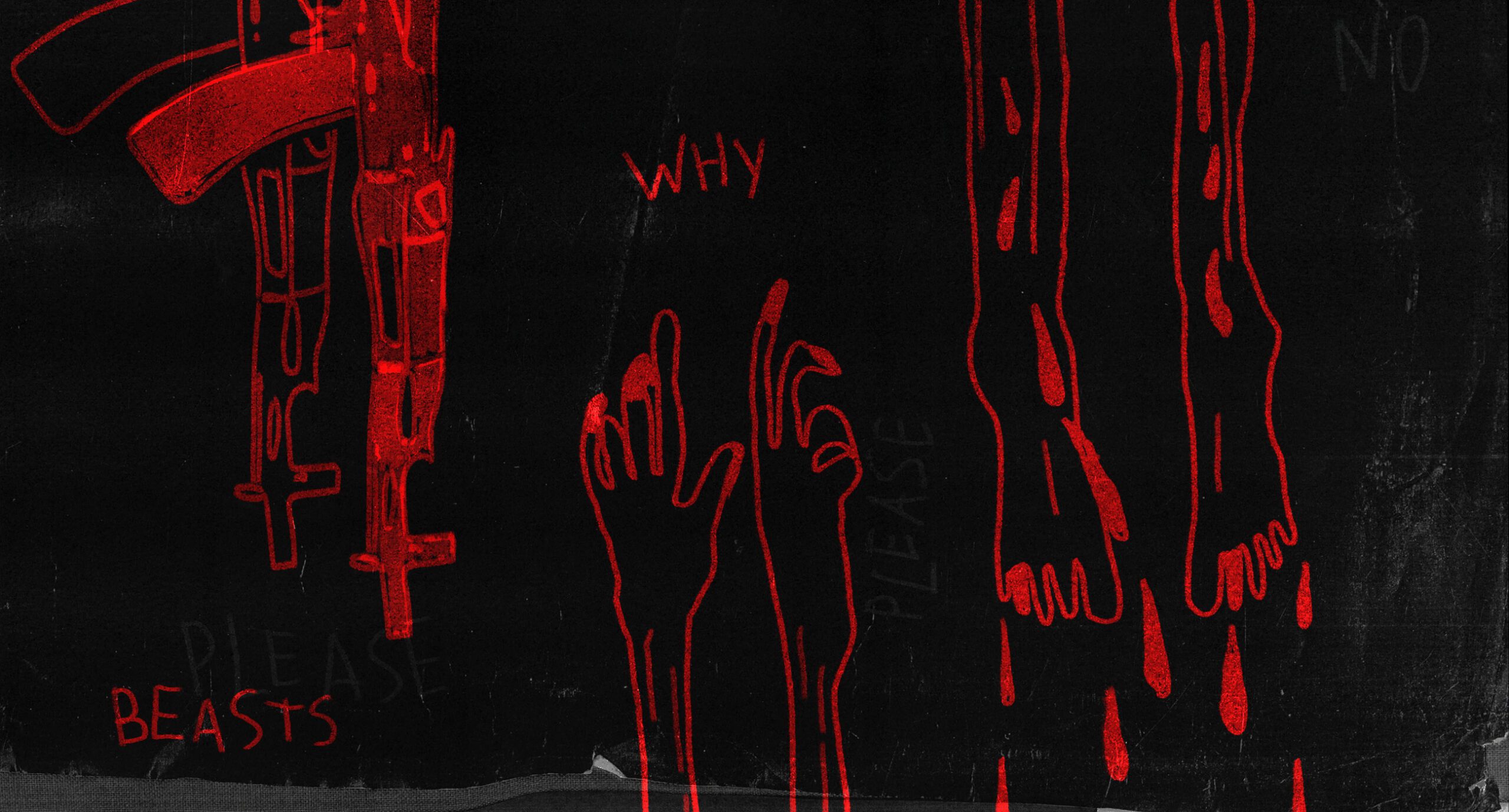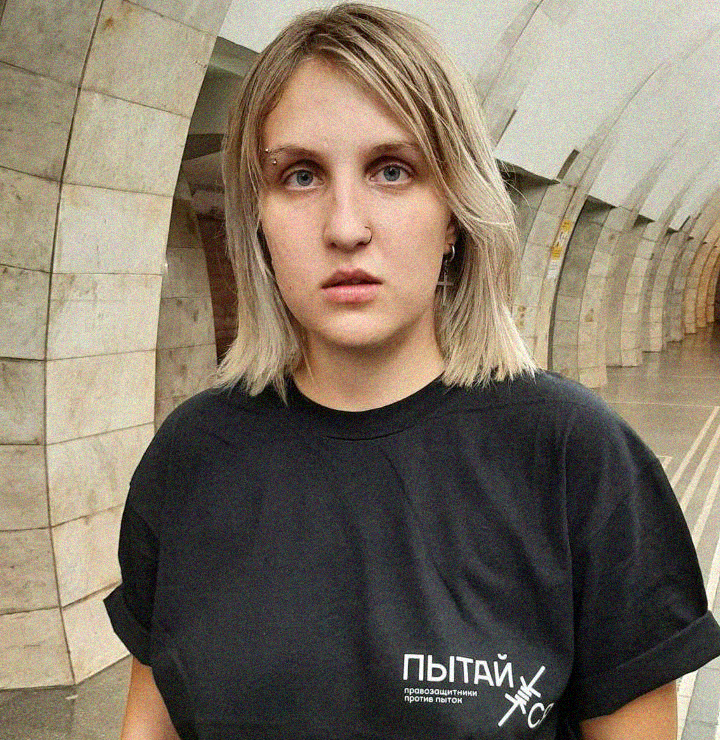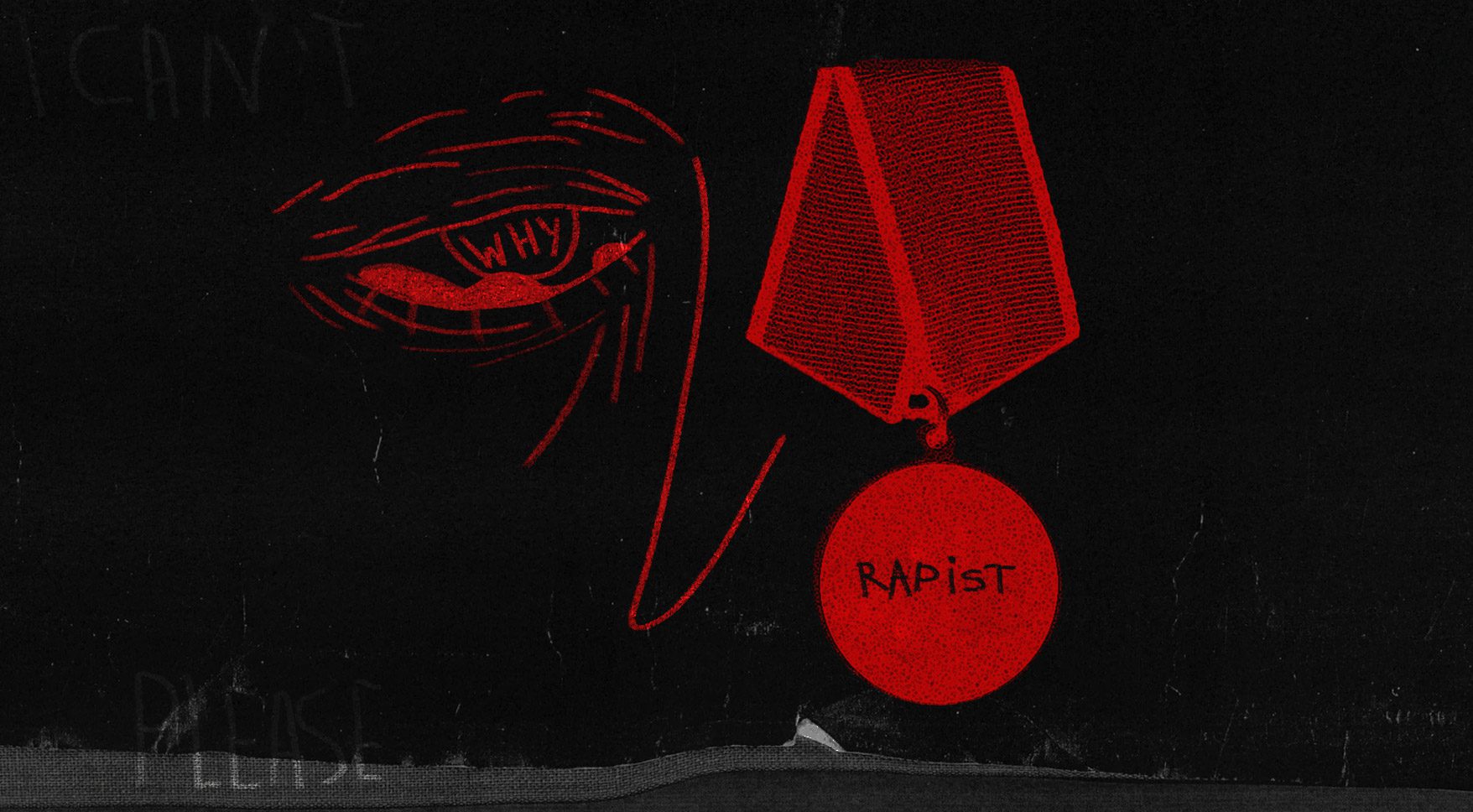Russian Soldiers Rape Women in Belarus. There Is No One to Protect Them

Over 400 reports of rapes committed by Russian soldiers were received by the Verkhovna Rada Commissioner for Human Rights hotline in the first two weeks of April alone. Sexualized crimes against women, girls, boys, men and the elderly became the hallmark of the Russian army during the full-scale war against Ukraine. People in the temporarily occupied territories are in particular danger. However, it is not just Ukrainians who are suffering from the actions of the Russian military – some Belarusian Telegram channels have recently spread the story of a female student from the Belarusian town of Mozyr who was raped by soldiers. But, as Zaborona has learned, this is not the only case. Journalist Anastasia Opryshchenko informs on what is happening now in the country where the Russian army is based, and why victims of rape in Belarus are not even protected by law.
What is the Russian army doing in Belarus?
In the autumn of 2021, the leaders of Belarus and Russia agreed to hold unscheduled military drills. At the end of November last year, the Minister of Defense of Belarus Viktor Khrenin announced this for the first time. In fact, the drills became a cover for the large-scale deployment of Russian troops in Belarus on the eve of the invasion of Ukraine. Russia has deployed about 30,000 troops near the Belarusian-Ukrainian border, which was the largest troop deployment in Belarus since the Cold War. On February 24, Russia started a war in Ukraine, using the territory of Belarus as a place of deployment of its military. Also, the Russian Federation has repeatedly launched missile strikes on Ukrainian cities from the territory of Belarus.
-

Collage: Kateryna Kruglyk / Zaborona
Already in early April, Russian troops withdrew from the occupied territories, in particular, to the unrecognized LDNR and Belarus. Leaving Ukrainian villages and towns, the occupiers massively killed and raped civilians, and in addition looted, taking not only equipment but also shoes, underwear, and hygiene items from Ukrainian homes. The looted goods were sent to Russia through the Belarusian postal service.
According to Belarusian activist Mariya (the name was changed for security reasons, the activist lives in Belarus), the Russian military could be found in some parts of the country in early February. Today, according to Belarusian journalists, 85% of Russian troops have been withdrawn, and in early April, when the Russian army began to leave the northern regions of Ukraine, the military could often be seen in Belarusian cities again. As a result, tensions between the local population and the army only increased.
“The military are constantly drunk; they roam the streets every day, looking for someone to offend, cursing. Russian servicemen come to the Minsk region for food. The shops are located near the school, so the military are constantly sticking around, apparently waiting for the end of the school day. That’s why all parents pick up their children, especially young girls, as soon as classes end,” Maria said in a conversation with Zaborona.
How do Belarusian women suffer from Russian soldiers?
The aggressive behavior of the Russian military in Belarus is not limited to threats and drunkenness. According to Mariya, local human rights activists are aware of at least four women who have suffered sexual abuse by members of the Russian army. One of the victims, a student from Mozyr, agreed to tell anonymously what Russian soldiers had done to her.
The video with evidence of rape appeared in the Belarusian media on April 6. On it, the crying girl says that she returned home in the evening after meeting with friends. Three drunken Russians in a car followed her. One of the soldiers had a machine gun. The girl tried to ignore them, but they grabbed her and dragged her into a car, where they raped her. She recalls that it was a van with black license plates – this indicates that the vehicle belongs to the Russian Ministry of Defense. The student did not know where she was being taken – the military put a bag on her head. They promised to kill the girl if she screamed, and when asked to let her go, they only answered, “you didn’t want to get to know each other willingly – so you will be forced to.”
The human rights activist emphasizes that in addition to the neglect of the topic of sexualized violence by the Belarusian authorities, there is huge pressure from the Russian-speaking audience, part of which spreads illusory ideas that the Russian military would never have done this. You can see such comments under almost every post on this topic. In addition, the Russian audience hints, and sometimes openly says, that Ukrainian women are allegedly massively engaged in sex work, which is why “Russian soldiers disdain sleeping with Ukrainian women.” The Russian media also supports these sentiments, spreading reports about the Ukrainian army raping and looting on its own territory. Vladimir Putin also called the crimes of the Russian army in Bucha a fake, and the Investigative Committee of the Russian Federation therefore opened a criminal case on “fakes”.

Collage: Kateryna Kruglyk / Zaborona. Screenshots from Twitter
Student Olga (name changed) lives in Minsk, but often visits her parents in Mozyr. In a conversation with Zaboroa, she said that since the beginning of the Russian invasion of Ukraine, a lot of soldiers and military vehicles have been stationed in the city. Olga’s parents and acquaintances who live in Mozyr say that the Russians often drive drunk, buy vodka, drive into the oncoming lane or leave the car in the middle of the road and go to the store.
“Personally, the military did not bother me and my acquaintances. However, it is still very scary; you can feel the tension – both psychological and physical. Part of the streets in the city do not have lighting at all, there are very few people in the evening, so I don’t go alone. Both me and my friends are scared,” the girl remarks. “However, there are those who don’t care. My friend’s mother happily waves to the soldiers, smiles and advises her daughter to do the same. And my grandmother, with whom I traveled to the neighboring places on the bus, said that she prayed for Russian soldiers every night, because our girls need to marry someone.”
Olga was terrified by the story of the Russian military’s crimes in Ukraine, and after the report of the rape in Mozyr, she felt anger: “You can expect anything from these creatures.”
“I spread information about the rape of a girl on social networks, many reposted the story. But there were those who didn’t believe it. They tried to find evidence that the raped girl from Mozyr was lying,” Olga explains. “I don’t know, maybe it’s such an instinct of self-defense – to believe that all this is not true. But, my God, I don’t know how you can be indifferent to this, to your safety issues and the safety of your loved ones, especially when you live in a city where there are so many Russian military.”
Where does the taboo on talking about violence come from in Belarus?
The human rights situation in Belarus has deteriorated over the past 10 years. Human rights defenders face restrictions on freedom of movement, expression, assembly and association, arbitrary detention and ill-treatment, intimidation and imprisonment. And women’s rights in Belarus in general have always been considered an issue that is inappropriate to talk about.
Until 2021, there were several national and regional registered organizations in Belarus working on domestic and sexualized violence, including Gender Perspectives, Province in Borisov, Her Rights. In 2021, all these organizations were liquidated as “harmful to Belarusian society.” Among them is the Radislava family shelter, which has been helping women victims of domestic violence for more than 20 years.
On November 9, 2021, the former director of the shelter Olga Gorbunova was arrested by Belarusian police in Minsk. The reason for the arrest was Olga’s probable participation in the organization of women’s human rights marches in the summer of 2020. The human rights activist is still in jail.
In 2020, after the rigged presidential election, the Women’s March was held, in which participants spoke out against Lukashenko and violence by law enforcement agencies. Self-proclaimed President Alexander Lukashenko is far from the ideas of feminism and has said many times that women simply will not be able to lead the country, and continued to promote patriarchal ideas. Lukashenko called the law against domestic violence “Western nonsense”. And the country’s incumbent leader has criticized human rights and civic activities, claiming that human rights organizations employ thousands of people “brainwashed for other people’s money.” Over the past six months, 116 public associations have been liquidated in Belarus.
“Today, participation in the work of liquidated or unregistered organizations in Belarus is an administrative or criminal offense, depending on what topic you are dealing with and how inconvenient this topic is for a state,” Mariya explains. “If you and I decide just as two people to help victims of domestic violence – it’s a crime. Raising money for help on social networks is also a crime.”
Therefore, there are currently no structures in Belarus to help victims of sexual violence. There are officially so-called women’s help offices in the country, and they are often run by male psychologists who have no idea how to work with victims. Last year, the head of one of these offices gave an interview in which he said that feminists were inflating the problem of violence in Belarus because they had not received a single appeal in a year. And he advised women in a situation of violence to always reconcile with their husbands and keep their marriage, because “no one needs a single woman.”
“If you were raped, there is no place in Belarus now with qualified specialists where you can call to ask for help. The victim may go to the police station, where she will see poorly qualified male specialists, who have been beating and torturing detainees at protests since 2020. Everything the girl is told by the police is “it’s your own fault.” They can make fun of it, although formally in Belarus there is an article “rape” in the Criminal Code,” says Maria.
What does the legislation of Belarus say?
Belarusian lawyer and human rights activist Dasha Churko emphasizes that there is a legal default in Belarus. Laws work only as it is convenient for the state. Therefore, there is no law on combating domestic violence.
“Belarus has the SDS (socially dangerous situation) institution. This is when the family is registered as dysfunctional. These families often include women who have been victims of domestic violence or openly protest against the authorities: “That is, a woman calls the police because of violence, and she is told: “we will put you on the SDS list” and / or “take your children away”. This is a serious obstacle for a woman to protect herself and her child, ”explains Churko.

Dasha Churko
The human rights activist notes that there is a protection procedure in the country, which in some way regulates the issue of domestic violence. It provides for the possibility of applying a protective order when the aggressor is prohibited from living with, calling, communicating and approaching the victim for a period of 1 to 30 days. You need to go through the whole procedure to get a protective order, and this is not possible in every case (for example, if the violence took place in a family, the couple divorced and no longer live together, but the violence continues).
“However, the solution of the issue depends on the person accepting the application in the office. Now the opportunity for justice has diminished. Women in Belarus hardly turn to the police. There are situations when a victim of violence is victimized [when the victim is blamed for the crime, not the perpetrator]. International bodies could improve the situation, but without national courts the victims’ cases will not be accepted into the Convention for the Protection of Human Rights and Fundamental Freedoms or in the UN Convention on the Elimination of All Forms of Discrimination against Women (CEDAW). First, violence must be declared publicly in Belarus,” Dasha said.
So the situation with sexual violence in Belarus is complicated by the fact that women have no rights. In addition, women in Belarus are currently under psychological pressure due to the massive dissemination of information about rape by the Russian military in Ukraine.
Here is what users from Belarus write under the post about rape in Mozyr:
“Everything is turned upside down in our country. Then it will be turned out that she attacked them.”
“Unfortunately, she still needs to find a doctor who will agree to give such a conclusion [about rape].”
“Talking about medical examination – this can be done in a normal country. And who can say that the order was not issued from above to hide such cases, “so as not to tarnish the image of allies.”
“Yeeees, our state, of course, will help. If you turn to the police in this case at this time, there is an opportunity for you to be jailed.”

Collage: Kateryna Kruglyk / Zaborona
What to do if you are a victim of violence?
If a person has experienced violence, human rights activist Mariya recommends ensuring physical and psychological safety. The most important thing is to seek emergency medical care and get the necessary medication, as well as undergo a medical examination and obtain a statement, which can be used when talking to police. In Belarus, you can turn to a social worker who will help restore a sense of at least partial psychological security.
On March 22, Iryna Venedyktova first reported suspicions of rape to the Russian military. Testimonies of victims of sexualized violence are collected by the YurFem Women’s Lawyers Association. Larysa Denysenko, co-founder of the organization, emphasizes that when investigating rape during the war, international courts do not require medical evidence to confirm a woman’s history, so a doctor’s report on the fact of rape is not mandatory.
It is important that victims are not left alone with their pain, but feel safe, have somewhere to turn and who to tell about the rape. Therefore, you can call the 24/7 anonymous hotline of the La Strada human rights organization: 116 123, 0 800 500 335.

Collage: Kateryna Kruglyk / Zaborona
Is it possible to bring the military to justice?
International criminal courts collect almost all evidence of violence during the war – in particular, these can be conversations intercepted by the SBU. Rescuers, volunteers, doctors, journalists, local authorities, police, friends and acquaintances of the victims, etc. can also report cases of violence.
At the same time, human rights activists and lawyers note that the punishment of perpetrators through international courts will be delayed. For example, since 2015, the International Criminal Court has ruled on whether its jurisdiction over crimes against humanity in Donbas and Crimea is sufficient. In 2020, the court gave a positive answer.
Today, 26 Ukrainian human rights organizations are working together on the topic of war crimes in Ukraine – this is the “Ukraine. Five in the Morning” coalition. Human rights activists involve volunteer documentarians who search for information in open sources and travel to the scene of incidents. Volunteers are preliminarily explained the international standards for recording information from open sources – the Berkeley Protocol.
At the same time, it is impossible to say that the sexual violence will end with the end of hostilities. There is a high probability that after the war, the Russian military will continue violence and killings, says Belarusian human rights activist Mariya: “Soldiers and military personnel in the war receive colossal trauma, many of them will return home mentally injured. Given the extremely low level of psychological education in Russia, many of these people will remain face to face with their newly acquired states. These states will be suppressed by alcohol, aggression against others, and isolation. In Russia, the scale of domestic violence is already enormous, and the psychological trauma of war will only exacerbate this situation and put many women in a vulnerable position.”
The article is created with the support of Media Network









